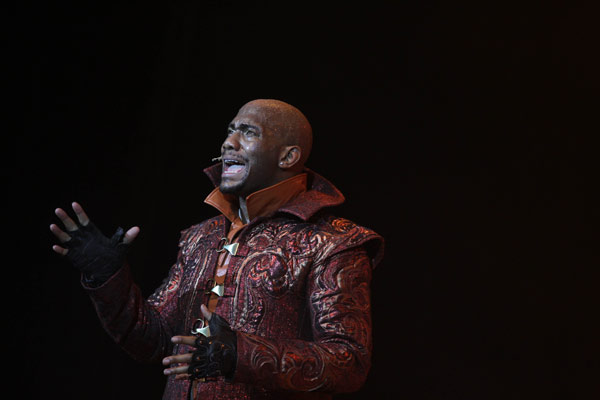Monkey around
Updated: 2013-11-21 01:14
By Chen Jie (China Daily)
|
|||||||||||
|
 |
|
Broadway actor Apollo Levine presents an aspiring Monkey King. Photos provided to China Daily |
The modernized version of the famous Monkey King musical makes jaws drop with its contemporary twists. The people behind the scenes share with Chen Jie their inspirations and their optimistic views about Chinese musicals.
Every Chinese grows up with the story of the Monkey King, but I'll bet not many have ever seen it like this: the main character is an African-American who dances hip-hop; the Emperor of Heaven wears Prada, Gucci and Armani; the Dragon King and his wife fight with each other about whether to give weapons to the monkey or not; their three daughters, all in modern dresses and high-heel shoes, compete for the heart of the monkey.
Everything in the new version of the Monkey King musical, co-produced by Beijing Performance & Arts Group and Beijing Genhua International Culture and Media, makes jaws drop.
Broadway actor Apollo Levine, who plays the monkey, sings in English while he duets with the Emperor of Heaven actor who sings in Chinese. The monkey converses in English with his followers, who all speak in Chinese.
Audiences may feel a bit disconnected in the first few minutes, but are soon so drawn by the actors' emotions and the dramatic story, that they will not find anything strange in the musical.
The story is no longer a hundred-year-old folklore about the gods, the spirits and Buddha, but an aspiring contemporary drama about a young man who keeps leaving home in search for adventures, after he gains power, he takes the responsibility to protect his family and finally realizes the value of home.
"I had no idea about the Monkey King before I came here. The cast and director are wonderful and they help me learn everything about the story. I watched movies and television versions," Levine says.
"I always try to find something in me similar to the character and get to the table. Ironically, I find myself in the monkey. Like him, I travel and explore everywhere. I don't want to stay at home. The play helps me to find my responsibility in my family."
Cao Jin, president of Beijing Genhua, says they received government funding to do a musical with an international cast and aspired to take it to Broadway. He was introduced to Tony Stimac, a veteran Broadway musical producer.
Stimac invited the American team including James Racheff, who has been a playwright and lyricist for more than 25 years; the songwriter Louis St. Louis, who is also composer of the famous film Grease (1978) in which John Travolta sang the hit Sandy; and the Emmy Award nominee choreographer Bubba Carr.
"Monkey King in China is like Hamlet in the West, you have thousands of versions: Peking Opera, movie, TV...We have many modern dressed productions of Shakespeare, why not do a Monkey King that has never been done before," Stimac says in his Beijing office.
"We consider the Monkey King as China who overcomes all the difficulties and challenges and now has big power while the Heaven is like the West who always told China what to do. Now China has all the power, but learning to use that power now on the world scale is what China is dealing with and that is what the monkey has to do in the story."
The musical portrays a very touching relationship between the monkey and his fellow primates, the monkey and his master, and the monkey and his enemies.
"We want to humanize the characters. It's pretty hard to feel sympathy for Superman, because he can do anything. And the Monkey King is China's Superman. China invented the super hero 600 years ago before Iron Man, Batman, Spider-Man, Superman, and super heroes are very popular now in commercial entertainment. So we feel good to let the West know the Chinese super hero. But we want him to be as human as possible, so people could care about him," Stimac says.
As for the Dragon King, they add the element that he is very concerned about his belongings. The monkey comes and wants the weapon from him but he refuses.
"Many men and women in the world always fight over such matters. The wife wants to keep everything and the husband wants to throw them out. We think it's a human character," Stimac says.
Related Stories
Musical excellence, not 'Chineseness', is key to acceptance 2013-11-14 07:30
2013 MTV Europe Music Awards 2013-11-12 11:05
Music that connects 2013-11-08 08:16
When music connects 2013-11-01 07:40
Today's Top News
Obama's rating drops to all-time low
In Asia-Pacific, HIV still high, report says
China, EU to launch investment discussions
European leader touts advantages of summit
PBOC to let yuan float more freely
Nation 'a strong Games candidate'
China mulls roadmap to tackle climate change
Tourism year proves a big hit
Hot Topics
Lunar probe , China growth forecasts, Emission rules get tougher, China seen through 'colored lens', International board,
Editor's Picks

|

|

|

|

|

|





